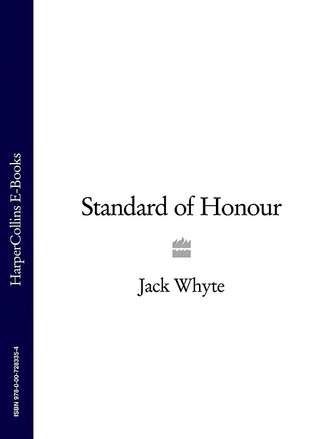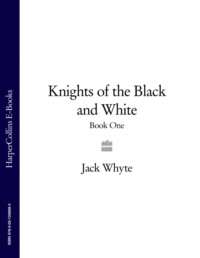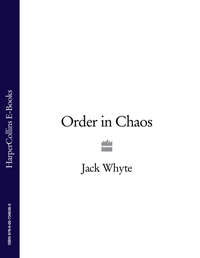
Полная версия
Standard of Honour
André’s brow wrinkled. “Disloyalty? How may that be, Father? We are discussing the Knights of the Temple. Their sole loyalty is to the Pope himself. No temporal ruler, be he emperor, king, or duke, has any claim upon their loyalty.”
“I am aware of that, André, as aware as I am of the fact that you are not yet one of them…unless there is something you have not told me about your present situation? Are you informing me that you have already been raised to the ranks of the elect?”
His father’s tone, raised in mock interrogation, was skeptical, and André was far from being surprised, but he had long since learned to accept that there were things about himself and his life that he could never reveal to his father, things they could never discuss. He waved one hand and shook his head before standing up and walking to the great iron brazier in the hearth, where he set his wine cup on the mantel before squatting down to throw fresh fuel from the piled logs on one side of the fireplace onto the dying fire, thereby gaining himself some time to shake off and conceal the guilt that always affected him at such times, even after years of living with the knowledge that his secret had nothing to do with his filial love and respect for his father. But his silence did not go unnoticed, for his father now asked, somewhat peremptorily, “What are you dreaming about down there?”
André rose to his feet fluidly. “The Templars,” he said casually, lying without effort, as always, when it came to safeguarding the secrets of the brotherhood. “I was watching the flames licking the wood, and thinking that we won’t see much wood in Outremer. Not firewood, anyway. The people there burn camel dung, I’m told. That reminds me of a tale I once heard about a Templar sergeant whose primary duty, for several years, was to have his men gather up all the dung they could find in the streets of Jerusalem, for fuel.”
“That sounds like a worthwhile way to serve one’s God…”
André ignored his father’s sarcasm. “Apparently Hugh de Payens thought so, for he was the man who assigned the duty.”
“Hugh de Payens? Was he not—?”
“The first Master of the Temple, the Founder of the Order. Aye, Father, that was he.”
“Hmm.” Henry contemplated his son. “You think you really will join them, André, vows and all?”
A fleeting grin from his son reassured Sir Henry greatly.
“Oh, I think not, sir,” André drawled. “It’s an idea that flits through my mind from time to time, nothing more. I will fight as one of their force in Outremer, that is a promise given, but I doubt I will take the formal, binding vows.”
“Then why are you so involved with them, with this de Sablé fellow?”
“I’m not.” André’s eyes had widened as his father asked the question. “Not involved with the knights, I mean. With de Sablé, yes, but he is not a Templar, not yet. We are both working for Richard. Working hard, too.”
“Doing what?”
André’s face quirked into a smile. “Well, Sir Robert is organizing what may become the largest fleet of ships ever launched, whereas I am training men to use the new crossbow, the arbalest.”
“What’s new about a crossbow? This…what did you call it?”
“An arbalest, sir. It’s the latest, most up-to-date development of the weapon. As you know, I’ve loved the crossbow ever since I was strong enough to load one, and of course Richard himself has, too. Well, he and I started talking after he and Sir Robert came here that day, and he wanted to know about the shot I made—how I gauged it, aimed it, that sort of thing—when I killed the priest, that de Blois slug. One word led to another and the upshot of it was that he charged me with the task of putting training in place for new levies of crossbowmen immediately. Not to train arbalesters, you understand, but to train other men as teachers, and to place particular emphasis on training with the new arbalest. He is very keen on it, and I can see why.” “Have you spent much time with him since you left home?”
“With Richard?” André shook his head. “No, barely any time at all. A half hour here and there, and perhaps three hours the day he set me to the training task, for he wanted to be sure I understood what he required of me. Apart from that, I have seen him only five times since then, all of them from a distance as he rode by.”
“Good. That may be fortunate. Trust me, as your father, André. Be careful of Richard. Should you start spending more time close to him, you will find there are aspects of his character that will probably offend you. I’ll say no more than that, for you are old, smart, and ugly enough now to see such things for yourself and draw your own conclusions, but if you do find yourself growing disgusted at any time, in God’s name keep your displeasure shielded from his eyes. Richard mislikes being disapproved of, almost as much as being crossed. He resented it as a boy and I doubt he has grown out of that.” Henry watched his son’s face darken with curiosity, but waved an extended finger in dismissal of the topic. “Tell me, then, why the enthusiasm for this new arbalest device? What is so different about it, compared with any other crossbow?”
André’s eyes lit up with enthusiasm. “Power,” he said. “Sheer, unbelievable power. And accuracy. It’s named after the old Roman weapon, the ballista. Do you know what the ballista was?”
His father’s head came up as though he had been stung. “Do I know—? God’s teeth, boy, do you really think me that ignorant? I was a Master-at-Arms before you were even born! It was an artillery piece, modeled after the Greek catapulta, the original crossbow. Ballistae were large, two-armed throwing devices, made of wood and powered by torsion ropes wound by ratchets, and they could hurl a stone or sometimes a heavy spear for half a mile and more, predictably and accurately.”
His son was nodding eagerly, still bright eyed. “Aye, made of wood, as you said. Well, the arbalest has a bow made of sprung, layered steel. It is far stronger than any wooden bow ever made, and unlike the ballista, it is portable. It is cumbersome, but it can be carried and operated by a single man, and a skilled operator, trained in its use, can fire two bolts, with enormous power and accuracy, in a single minute, and kill armored men more than five hundred paces away. I have one of them upstairs. Would you like to see it?”
“I would.”
“Well then, in the morning, if you can haul your ancient bones from your bed, perhaps I will grace you with a demonstration. I think you’ll be amazed.”
Henry smiled. “I’ll be amazed if you manage to raise your tired carcass from slumber before I’ve dressed and broken fast. We shall see who feels more ancient come sunrise tomorrow.”
André laughed. “Aye, we’ll see. Sleep well, Father.”
He left his father with a smile, enjoying this echo of their raillery of old, but as he made his way towards his cot, he felt the painful distance that was now between them, a distance born of knowledge and secrecy.
Sir Henry thought of the Templar Knights as being the elect, and although they might arguably be so, to a minor and very limited extent, André knew that his father was wrong, and that he could never imagine that his son was already one of the true elect: an initiated brother in an ancient and secret order whose existence Sir Henry, as an outsider, could never be permitted to suspect.
Accepting that awareness, years earlier, had been a difficult task for André, eased only by the recognition that it had been shared by every individual initiate of the ancient brotherhood into which he had been inducted, or Raised as his brethren called the initiation, at the age of eighteen, even before being knighted by Duke Richard.
The brotherhood conducted its affairs beneath a shroud of inviolable secrecy, with a simply stated purpose: to safeguard and study the incalculably valuable secret that was its sole reason for being. From the moment of his Raising to a full-status brother, André had grown increasingly fascinated with the reality of that secret, so that now, endlessly enthralled by what it all entailed, he found himself thinking of varying aspects of it at different times, every day of his life, no matter what he was doing or where he might be.
For more than a millennium, ever since the end of the first century of Christianity, its presence unsuspected and undreamed of by anyone outside its own ranks, the organization, the brotherhood, had been known to successive generations of initiate brothers as the Order of Rebirth in Sion, and throughout that time its members had been studying the great body of lore that lay at the root of its being. The secret they guarded so zealously and jealously was one so old and so alien to their everyday world that it defied belief, perhaps even more so now than ever before, after eleven hundred years. It had certainly defied André’s belief when he first learned of it, and he now believed implicitly that it had affected every one of his initiate brethren, older and younger, living and dead, in the same way since time immemorial, for alien it was. Its substance was inconceivable, and awareness of its mere existence induced nausea, profound terror, and the appalling possibility of eternal damnation, with the irretrievable loss of one’s immortal soul and forfeiture of any possible hope of achieving salvation on either side of death. And so the initiates questioned it vigorously and disputed its credibility with everything—every whit of logic, intellect, and instinctual horror and distaste at their disposal—beginning as soon as the trauma of their introduction to it had begun to wear off. And every individual initiate who fought against it came to appreciate, eventually, that every single one of his brethren, over the past thousand years, had shared the same odyssey and come to harbor at the end of it, at ease with the immensity of what he had learned to be the absolute truth. And one by one the entire brotherhood, to a man, became content to dedicate the remainder of their lives to proving that truth, by proving the truth underlying the lore of the Order.
That unity of purpose had survived unbroken, André knew, until approximately sixty years earlier, in 1127, when the Order had renamed itself by dropping the word Rebirth from its title, calling itself simply the Order of Sion. Only the brothers themselves knew of the change, and they smiled with pride when they thought of it, for after a millennium, the Rebirth had been achieved when a small group of nine knights from the Languedoc area, all of them members of the brotherhood, led by a man called Hugh de Payens, had excavated under the foundations of the Temple Mount in Jerusalem, and, after searching diligently and in secret for eight years, had unearthed exactly what the Order’s lore had told them would be in that precise place.
Thinking about what he knew, and what his father would never know, André lay his head down that night feeling more like a stranger in his father’s home than he had ever felt before.
THE NEXT MORNING, father and son were out in the training yard between the castle and its outer walls, waiting for sunrise, neither one enthusiastic about being there or about acknowledging the other’s presence. Sir Henry stood back with the heavy arbalest in his arms while André stooped close to the front wall of the yard in the dim light of the newborn day, a quiver of heavy crossbow bolts dangling from his shoulder, and carefully examined the old and battered balk of oak used for sword practice.
“This will serve, for now,” he said, striding back to join his father. “I’ll shoot from over yonder on the other side. The light will soon be strong enough for us.” He then led the way to the far side of the yard, less than fifty paces from the thick practice post, where he took the heavy weapon from Sir Henry and proceeded to arm it. Henry could see that his son was an expert in its use, for he pressed it front down against the ground and placed his foot firmly in the stirrup at the end, then leaned forward, bracing the butt end against his belly while he used both hands to wind the pair of swivel ratchets that dragged the bowstring of thickly woven leather back, against the pull of the steel bow, until it tipped and was held in place by the notched end of the trigger that protruded through the body of the weapon, at the end of the channeled groove that would hold the feathered bolt. It was hard work, and his father admired the way André performed the task with the ease and skill of a master.
Конец ознакомительного фрагмента.
Текст предоставлен ООО «ЛитРес».
Прочитайте эту книгу целиком, купив полную легальную версию на ЛитРес.
Безопасно оплатить книгу можно банковской картой Visa, MasterCard, Maestro, со счета мобильного телефона, с платежного терминала, в салоне МТС или Связной, через PayPal, WebMoney, Яндекс.Деньги, QIWI Кошелек, бонусными картами или другим удобным Вам способом.




